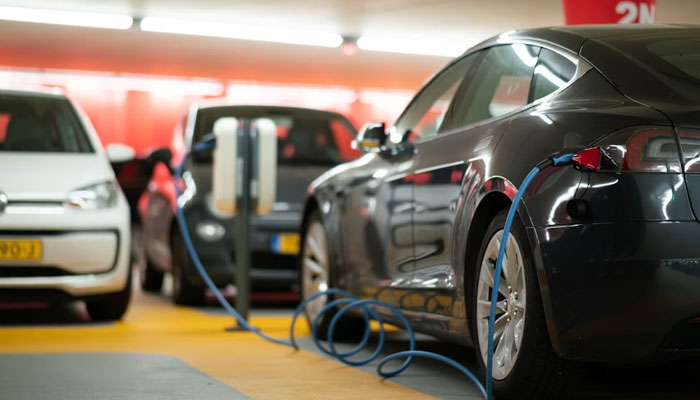Manufacturers of four-wheel EVs seek tax exemption for two years
EV Manufacturers have proposed amendments in Customs Act to Ministry of Industries and demanded allowing SKD parts of 4-wheel electric vehicles in country for five years
ISLAMABAD: After securing the Electric Vehicle Manufacturing (EVM) license for 2-3 Wheels by 34 companies, the manufacturers of 4-wheel EVM proposed to the government to grant tax exemptions of sales tax, income tax, and customs duty for two years.
They have also proposed to the government to include Semi Knocked Down (SKD) parts of the 4-wheel electric vehicles in the upcoming budget for 2024-25. The EVM has asked the government to amend the Customs Act and grant permission for the inclusion of SKD parts of 4-wheel EVM for five years at a rate of 10 percent customs duty.
At the moment, only CBU and CKD parts are allowed for the import of vehicles but in the shape of SKD, there is no permission. The EV Manufacturers have proposed amendments in the Customs Act to the Ministry of Industries and demanded allowing SKD parts of 4-wheel electric vehicles in the country for five years.
“There are around 700 parts for manufacturing an electric vehicle but if the government allows it could be imported in a consignment of 50 items so there is a need to allow the import of SKD on an immediate basis,” the EV manufacturers told The News in background discussions here on Wednesday.
Three major Chinese companies are trying to make their footprints in the EVM including Pak-China Huzai Green Energy, M/S MG company, and M/S DFSK Motors. The EVM manufacturers have proposed that to import CBU units, there should be an exemption of taxes such as a sale tax of 18%, income tax of 12%, and additional customs duty of 7% for at least 2 years.
Such measures will help to decrease the import of gasoline products and save foreign currency. It is proposed that the Engineering Development Board – Provincial Assembling/OEM certificate be issued under a specific time framework. No lead-acid batteries are allowed to be used in any category of EVs. (lithium iron phosphate battery (LiFePO4) be used).
The vendors must give specific guaranty of batteries. (for 2 & 3 Wheelers minimum 2 years and 4 Wheelers Up to 120,000 Km). Special incentives and grants are given for Research & Development (R&D) to different universities/ organizations to develop new EV projects. Grants are provided to different educational institutions to train human resources development for local and international markets including scholarships to deserving students. Only certified human resources should be allowed to work with industry. The Higher Education Commission (HEC) should prepare a curriculum for BS & MS level including the needs of future technology, vehicle design, and soft skills. The EV/Battery & Motor Quality Standards must be maintained.
The Standards required for the construction and operation of charging stations, as well as technical specifications for charging connectors. A Special Financial loan policy is required from States Bank, as incentive from city governments for charging stations network.
All new filling stations must have EV charging facilities. All present oil marketing companies are directed to provide EV charging facilities on a priority basis (PSO, Shell, Total, etc.). The Nepra should announce a special discounted rate for EV charging companies. It is proposed to allow Special Green plates for all EVs to promote the EV industry.
The Engineering Development Board (EDB) had already granted licenses to 34 manufacturers of 2 and 3-Wheel EVM. There is a stumbling block lying in the way for EVM in the shape of allowing imports of parts of EVM at specified rates so that its manufacturing could achieve momentum in months and years ahead.
When contacted to one top official of Engineering Development Board (EDB) for seeking comments, he said that they allowed 40 manufacturers so far to make 2 and 3 Wheel EVMs. However, he said that SKD related incentives were not allowed. He said that two to three groups were interested to manufacture 4-wheels vehicles including Dewan Group.
He said that the policy was there and the EVM might come into market but there were issues related to charging batteries and pricing. He said that the leasing of EVM vehicles could be required to boost up EVMs.
-
 Why Nicole Kidman 'not Rushing' Into Love After Split From Keith Urban?
Why Nicole Kidman 'not Rushing' Into Love After Split From Keith Urban? -
 Benny Blanco's Dirty Feet In Debut Podcast Divide The Internet
Benny Blanco's Dirty Feet In Debut Podcast Divide The Internet -
 Jeffrey Epstein Blamed King Charles As Andrew Left Trade Enjoy Job
Jeffrey Epstein Blamed King Charles As Andrew Left Trade Enjoy Job -
 King Charles Asked To Lean On Princess Anne To Avoid ‘media Circus’
King Charles Asked To Lean On Princess Anne To Avoid ‘media Circus’ -
 Passenger Wins £10,000 Payout From Heathrow Airport After 100 Ml Liquids Dispute
Passenger Wins £10,000 Payout From Heathrow Airport After 100 Ml Liquids Dispute -
 Eric Dane's Costar Under Fire For Hurling Accusations At Him After His Death
Eric Dane's Costar Under Fire For Hurling Accusations At Him After His Death -
 Queen Camilla Greets The Paddington Bear At BBC’s 500 Words Grand Final
Queen Camilla Greets The Paddington Bear At BBC’s 500 Words Grand Final -
 Chinese Astronauts Finally Reveal Why Spacecraft Left Them ‘stranded’ For 437 Days In Space
Chinese Astronauts Finally Reveal Why Spacecraft Left Them ‘stranded’ For 437 Days In Space -
 Sinitta Makes Shock Admission About Marriage To Andy Willner Post Simon Cowell Heartbreak
Sinitta Makes Shock Admission About Marriage To Andy Willner Post Simon Cowell Heartbreak -
 Bill Gates Calls Ties To Jeffrey Epstein 'huge Mistake,' Reveals Past 'affairs'
Bill Gates Calls Ties To Jeffrey Epstein 'huge Mistake,' Reveals Past 'affairs' -
 Switzerland Announces One-time Compensation For Swiss Bar Fire Victims
Switzerland Announces One-time Compensation For Swiss Bar Fire Victims -
 Ryan Coogler Shares Thoughts About Building Community Of Actors Amid 'Sinners' Success
Ryan Coogler Shares Thoughts About Building Community Of Actors Amid 'Sinners' Success -
 Heidi Klum Gushes Over Diplo Collab 'Red Eye' Despite DJ Falling Asleep During Video
Heidi Klum Gushes Over Diplo Collab 'Red Eye' Despite DJ Falling Asleep During Video -
 Israel Behind Majority Of Journalist Deaths Worldwide, Watchdog Claims
Israel Behind Majority Of Journalist Deaths Worldwide, Watchdog Claims -
 'It Would Become A Circus' : Inside Jane's Turmoil For 'little Sister' Fergie Whose Hidden From The World
'It Would Become A Circus' : Inside Jane's Turmoil For 'little Sister' Fergie Whose Hidden From The World -
 Inside Cardi B's Real Feelings Related To Stefon Diggs Split Post One Year Of Romance
Inside Cardi B's Real Feelings Related To Stefon Diggs Split Post One Year Of Romance




